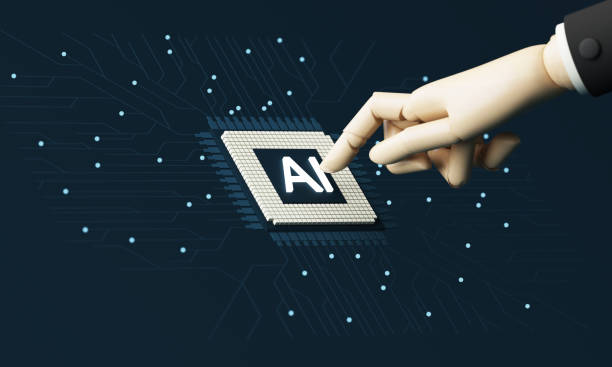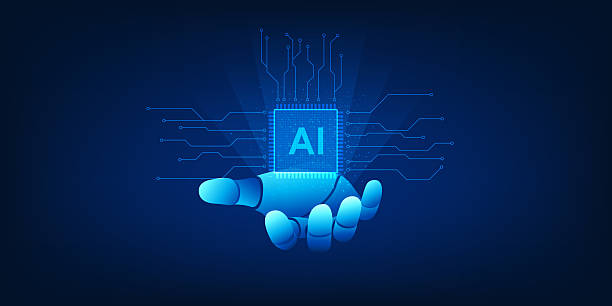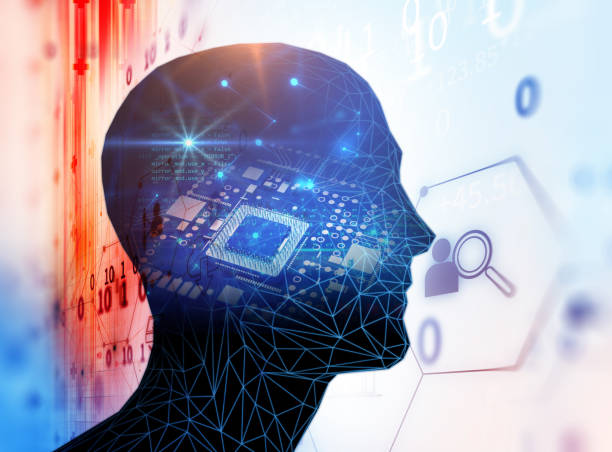What is Artificial Intelligence and How Does it Work?

#ArtificialIntelligence (AI) or Artificial Intelligence is a branch of computer science that deals with building machines capable of performing tasks that typically require human intelligence.
These tasks include learning, reasoning, problem-solving, perception, and natural language understanding.
Artificial intelligence tries to simulate human thought processes using algorithms and mathematical models.
These algorithms allow machines to learn from data, identify patterns, and make decisions.
Artificial intelligence is classified into two main categories: Weak AI (Narrow AI), which is designed to perform specific tasks, and Strong AI (General AI), which is capable of performing any task that a human can.
The function of Artificial Intelligence is based on collecting data, analyzing it, and using algorithms to predict or make decisions.
This process usually includes the following steps:
- **Data Collection**: Collecting a large amount of data related to the problem at hand.
- **Data Preparation**: Cleaning, organizing, and converting data into a suitable format for processing.
- **Algorithm Selection**: Selecting the appropriate algorithm based on the type of problem and data.
- **Model Training**: Using data to train the artificial intelligence model.
- **Model Evaluation**: Evaluating the model’s performance and optimizing it.
- **Model Usage**: Using the model to predict or make decisions in real-world conditions.
Does your current website convert visitors into customers or drive them away? Solve this problem forever with professional corporate website design by Rasaweb!
✅ Creating a powerful brand and credibility
✅ Attracting target customers and increasing sales
⚡ Get a free consultation now!
Different Types of Artificial Intelligence and Their Applications

Artificial intelligence has different types, each with its own specific applications.
Some of the most important types of artificial intelligence include:
- **Machine Learning**: This type of artificial intelligence allows machines to learn from data without being explicitly programmed.
Machine learning includes various algorithms such as regression, classification, and clustering. - **Neural Networks**: This type of artificial intelligence is inspired by the structure of the human brain and includes a network of nodes (neurons) that interact with each other.
Neural networks are used for pattern recognition, natural language processing, and machine vision. - **Natural Language Processing**: This type of artificial intelligence allows machines to understand and generate human language.
Natural language processing is used in applications such as machine translation, sentiment analysis, and chatbots. - **Computer Vision**: This type of artificial intelligence allows machines to understand and interpret images and videos.
Computer vision is used in applications such as facial recognition, object detection, and self-driving cars. - **Robotics**: This type of artificial intelligence deals with the design and construction of robots capable of performing various tasks.
Robots are used in applications such as manufacturing, medicine, and space exploration.
The applications of artificial intelligence are very broad and are used in various industries, including medicine, finance, transportation, manufacturing, and customer service.
For example, in medicine, artificial intelligence can help diagnose diseases, develop drugs, and provide personalized care.
In finance, artificial intelligence can help detect fraud, manage risk, and provide investment advice.
Advantages and Disadvantages of Using Artificial Intelligence

Using artificial intelligence has numerous advantages and disadvantages that should be considered:
Advantages:
- **Increased Efficiency**: Artificial intelligence can perform tasks faster and more accurately than humans, which leads to increased efficiency and productivity.
- **Error Reduction**: Artificial intelligence can reduce errors and improve the quality of products and services.
- **Task Automation**: Artificial intelligence can automate repetitive and tedious tasks, allowing humans to focus on more creative and strategic tasks.
- **Improved Decision Making**: Artificial intelligence can provide valuable information by analyzing large data sets, which helps improve decision-making.
- **24/7 Service Provision**: Artificial intelligence can provide services 24 hours a day, 7 days a week, which leads to increased customer satisfaction.
Disadvantages:
- **High Cost**: Implementing and maintaining artificial intelligence systems can be expensive.
- **Job Losses**: Automation of tasks can lead to job losses, requiring retraining and career changes.
- **Ethical Concerns**: The use of artificial intelligence can raise ethical concerns such as discrimination, privacy, and security.
- **Data Dependency**: The performance of artificial intelligence depends on the quality and quantity of data, and incomplete or incorrect data can lead to incorrect results.
- **Lack of Transparency**: Artificial intelligence algorithms can be complex and incomprehensible, leading to a lack of transparency and accountability.
| Advantages | Disadvantages |
|---|---|
| Increased Efficiency | High Cost |
| Error Reduction | Job Losses |
| Task Automation | Ethical Concerns |
| Improved Decision-Making | Data Dependency |
| 24/7 Service Provision | Lack of Transparency |
What Will the Future of Artificial Intelligence Be?
![]()
The future of artificial intelligence is very bright and full of potential.
With rapid advances in technology, artificial intelligence is expected to play a more important role in our lives in the coming years.
Some of the important trends in the future of artificial intelligence include:
- **Artificial General Intelligence (AGI)**: Developing strong artificial intelligence that is capable of performing any task that a human can.
- **Explainable Artificial Intelligence (XAI)**: Developing artificial intelligence algorithms that are able to explain their decisions.
- **Ethical AI**: Developing ethical principles and standards for the use of artificial intelligence.
- **Ubiquitous AI**: Expanding the use of artificial intelligence in all aspects of our lives.
- **Personalized AI**: Developing artificial intelligence systems that meet the specific needs of each individual.
Artificial intelligence can help solve many global problems such as climate change, chronic diseases, and poverty.
However, for the responsible and ethical use of artificial intelligence, cooperation between governments, companies, and civil society is needed.
Does your current company website present a worthy image of your brand and attract new customers?
If not, turn this challenge into an opportunity with Rasaweb’s professional corporate website design services.
✅ Dramatically improves your brand image and credibility.
✅ Paves the way for attracting leads and new customers.
⚡ Contact Rasaweb now for a free and expert consultation!
Ethical Challenges of Artificial Intelligence and Proposed Solutions

The use of artificial intelligence is associated with several ethical challenges.
Some of the most important ethical challenges include:
- **Discrimination**: Artificial intelligence algorithms can be discriminatory if trained on discriminatory data.
- **Privacy**: The collection and use of personal data by artificial intelligence systems can violate people’s privacy.
- **Security**: Artificial intelligence systems can be attacked and used for malicious purposes.
- **Accountability**: Determining responsibility in the event of an error or damage caused by artificial intelligence systems is difficult.
- **Transparency**: Artificial intelligence algorithms can be complex and incomprehensible, leading to a lack of transparency and accountability.
To address these ethical challenges, the following solutions are proposed:
- **Developing Fair Algorithms**: Using bias reduction techniques in the design and training of algorithms.
- **Protecting Privacy**: Using privacy-preserving techniques in the collection and use of data.
- **Securing Systems**: Using strong security methods to protect artificial intelligence systems.
- **Determining Accountability**: Creating laws and regulations to determine responsibility in the event of an error or damage.
- **Increasing Transparency**: Developing explainable artificial intelligence algorithms that are able to explain their decisions.
Artificial Intelligence in Iran: Prospects and Opportunities

Artificial intelligence is also developing in Iran and has high potential for growth.
The Iranian government and private companies are investing in this field and trying to use artificial intelligence in various industries.
Some of the important opportunities of artificial intelligence in Iran include:
- **Developing Artificial Intelligence Software**: Creating software companies that operate in the field of artificial intelligence.
- **Providing Artificial Intelligence Services**: Providing consulting and training services in the field of artificial intelligence.
- **Using Artificial Intelligence in Various Industries**: Using artificial intelligence in industries such as oil and gas, agriculture, healthcare, and education.
- **Developing Artificial Intelligence Research**: Conducting scientific research in the field of artificial intelligence and publishing scientific articles.
- **Training Specialized Workforce**: Training a specialized workforce in the field of artificial intelligence through universities and educational institutions.
Given the high potential of artificial intelligence in Iran, this field is expected to grow significantly in the coming years and contribute to the country’s economic development.
Machine Learning: The #Main_Key to Artificial Intelligence

Machine learning is a subfield of #ArtificialIntelligence that allows systems to learn from data and improve without direct programming.
This process involves the use of various algorithms that allow systems to identify patterns, make predictions, and make decisions.
Machine learning is known as the main key to #ArtificialIntelligence because it is this capability that allows systems to automatically adapt to environmental changes and improve their performance.
There are different types of machine learning algorithms, each suitable for a specific type of problem.
Some of the most important types of machine learning include:
- **Supervised Learning**: In this type of learning, the system is trained using labeled data.
This means that the data includes inputs and expected outputs.
The goal is for the system to learn how to map inputs to appropriate outputs. - **Unsupervised Learning**: In this type of learning, the system is trained using unlabeled data.
The goal is for the system to identify hidden patterns and structures in the data. - **Reinforcement Learning**: In this type of learning, the system is trained by taking actions in an environment and receiving rewards or penalties.
The goal is for the system to learn how to take actions in a way that maximizes reward.
Machine learning is used in various applications such as facial recognition, voice recognition, fraud detection, recommenders, and self-driving cars.
| Learning Type | Description | Applications |
|---|---|---|
| Supervised Learning | Training with labeled data | Facial recognition, voice recognition |
| Unsupervised Learning | Training with unlabeled data | Clustering, dimensionality reduction |
| Reinforcement Learning | Training with reward and punishment | Games, robotics |
The Impact of Artificial Intelligence on the Job Market

Artificial Intelligence has a significant impact on the job market.
On the one hand, the automation of repetitive and routine tasks can lead to job losses.
On the other hand, #ArtificialIntelligence also creates new job opportunities, especially in areas such as #ArtificialIntelligence software development, data analysis, and management of #ArtificialIntelligence systems.
To succeed in the future job market, people need to learn new skills and adapt to new technologies.
These skills include critical thinking, problem-solving, creativity, collaboration, and digital literacy.
Some jobs that are likely to be in greater demand in the future include:
- #ArtificialIntelligence and machine learning engineers
- Data scientists
- Data analysts
- Cybersecurity specialists
- Automation specialists
To prepare for the future job market, people need to learn continuously and keep their skills up to date.
This includes participating in training courses, reading scientific articles, and attending conferences and seminars.
Did you know that customers’ first impression of your company is your website? Multiply the credibility of your business with a powerful corporate website from Rasaweb!
✅ Exclusive and eye-catching design tailored to your brand
✅ Improved user experience and increased customer acquisition
⚡ Get a free consultation!
The Role of Artificial Intelligence in Improving Daily Life

#ArtificialIntelligence plays an important role in improving our daily lives.
From recommender systems that suggest our favorite movies and music to voice assistants that help us perform tasks, #ArtificialIntelligence is changing the way we live.
Artificial intelligence in various applications such as:
- Improving Healthcare: Diagnosing diseases, developing drugs, and providing personalized care.
- Improving Transportation: Self-driving cars, traffic management, and improving road safety.
- Improving Education: Providing personalized training and improving access to educational resources.
- Improving Security: Detecting fraud, preventing crime, and protecting data.
- Improving Productivity: Automating repetitive tasks and improving work processes.
With the advancement of #ArtificialIntelligence, this technology is expected to play a more important role in improving our daily lives and helping to solve many global problems.
Important Tips for Learning Artificial Intelligence
![]()
Learning #ArtificialIntelligence is a challenging but valuable process.
To succeed in this field, consider the following points:
- **Have Strong Math and Statistical Foundations**: #ArtificialIntelligence is based on mathematical and statistical concepts.
To deeply understand this technology, you need to have strong math and statistical foundations. - **Learn Relevant Programming Languages**: Programming languages such as Python and R are essential for developing #ArtificialIntelligence applications.
- **Learn Machine Learning Algorithms**: Machine learning algorithms are the main tools of #ArtificialIntelligence.
You must understand these algorithms and be able to implement them. - **Do Practical Projects**: The best way to learn #ArtificialIntelligence is to do practical projects.
By doing projects, you can understand the concepts practically and develop your skills. - **Learn Continuously**: #ArtificialIntelligence is a changing field.
To stay up to date with the latest developments, you must continuously learn and keep your skills up to date.
With effort and perseverance, you can learn #ArtificialIntelligence and succeed in this field.
FAQ
| Question | Answer |
|---|---|
| What is Artificial Intelligence? | It is a simulation of human intelligence in machines programmed to think like humans and mimic their actions. |
| What are the main branches of artificial intelligence? | It includes machine learning, deep learning, natural language processing, computer vision, and robotics. |
| What is Machine Learning (ML)? | It is a branch of artificial intelligence that focuses on enabling systems to learn from data and identify patterns without explicit programming. |
| Mention examples of AI applications in our daily lives. | Voice assistants (such as Siri and Alexa), recommendation systems in Netflix and Amazon, self-driving cars, and facial recognition software. |
| What is Deep Learning (DL)? | It is a subset of machine learning that uses multiple layers (deep) artificial neural networks to process large amounts of data. |
| What is Natural Language Processing (NLP)? | It is a branch of artificial intelligence that focuses on enabling computers to understand, interpret, and generate human language. |
| What are some of the ethical concerns related to artificial intelligence? | These include bias in data, privacy, job losses, and liability in the event of errors. |
| What are the main benefits of artificial intelligence? | Increased efficiency, improved decision making, automation of repetitive tasks, and discovery of complex patterns in data. |
| How is artificial intelligence used in the healthcare field? | In diagnosing diseases, discovering drugs, analyzing medical images, and personal care for patients. |
| How do you see the future of artificial intelligence? | It is expected to continue to develop at a rapid pace, affecting all aspects of human life, from industry to education and entertainment. |
And other services of Rasa Web Advertising Agency in the field of advertising
Intelligent linking: an exclusive service to increase click-through rates based on user experience customization.
Intelligent conversion rate optimization: a fast and efficient solution for managing campaigns with a focus on designing an attractive user interface.
Intelligent marketing automation: an exclusive service to increase sales based on the use of real data.
Intelligent marketplace: Transform customer behavior analysis with the help of marketing automation.
Intelligent digital branding: an exclusive service to grow user engagement based on precise audience targeting.
And more than hundreds of other services in the field of internet advertising, advertising consulting, and organizational solutions
Internet Advertising | Advertising Strategy | Advertorial Report
Resources
What is Artificial Intelligence? What do you know about artificial intelligence?
,Will artificial intelligence replace humans?
,The role of artificial intelligence in our lives; Opportunities and Challenges
,Artificial intelligence; Threat or Opportunity?
? To be seen in the digital world and reach the peak of success, Rasa Web Digital Marketing Agency is with you. By providing specialized services, including professional WordPress website design and targeted SEO, we will bring your business to the position it deserves. For free consultation and to start your business’s digital transformation, contact us.
📍 Tehran, Mirdamad Street, next to the Central Bank, South Kazerun Alley, Ramin Alley, No. 6
“`




